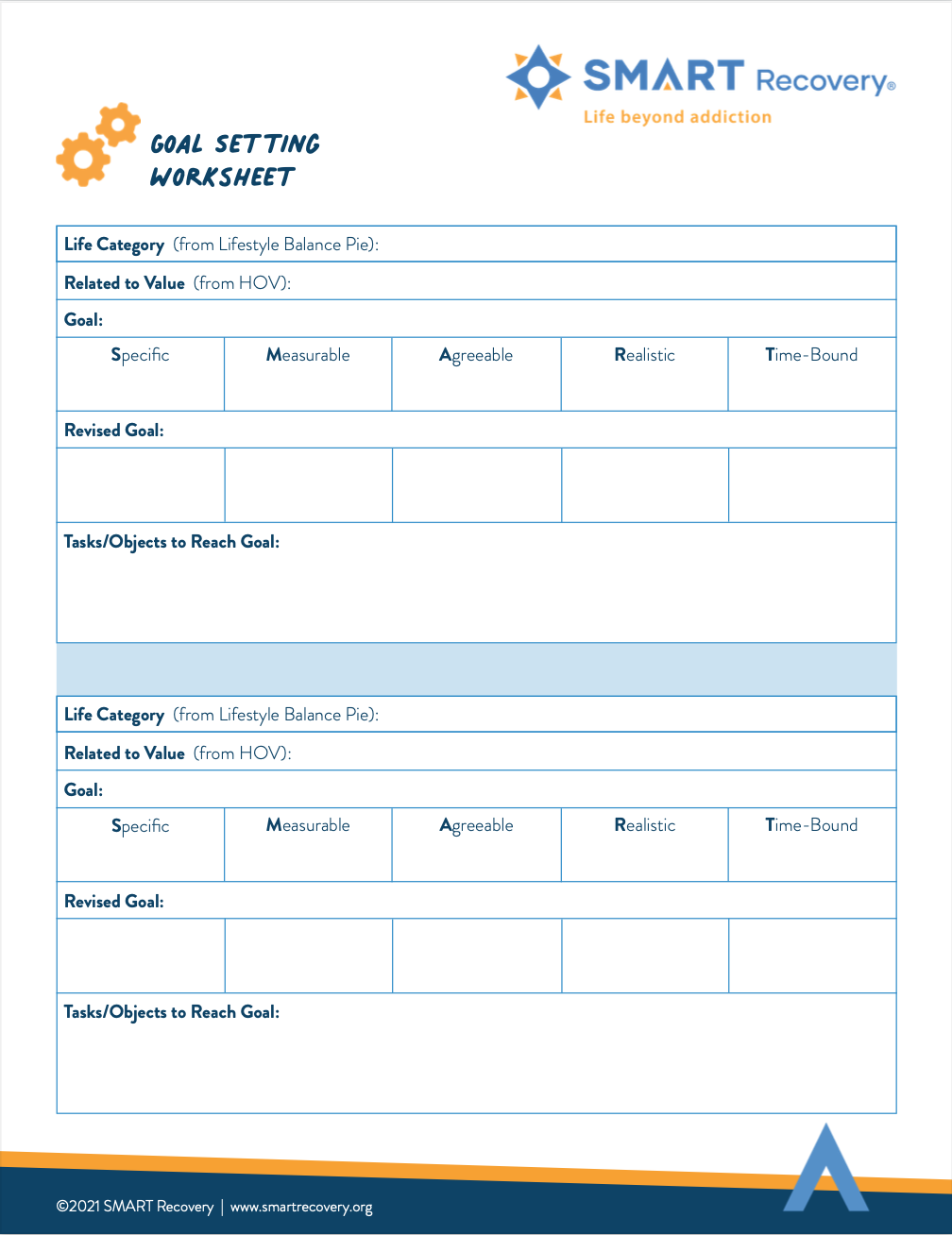Point 4
Goals help maintain focus on achieving balance and directing energy toward a new life and away from an old one.
Using values as your guide will help set priorities and point your new life in the direction you want it to go.
EXERCISE: Values, goals, and planning
Establishing values and goals, and creating plans and strategies to achieve those goals are essential to all aspects of recovery, especially when creating a balanced life. Our values guide our lives, from the long-term goals we set to the day-to-day choices we make. Consciously defining and living your core values are empowering because your values are the essence of who you are. Your values may include honesty, fidelity, reducing your environmental footprint, not eating meat, honoring your elders, parenting based on love instead of fear, etc. If honesty is one of your values, then one of your goals might be, “If I have a lapse, I will tell someone as quickly as I can”; or “I will be honest with my children about my past.”
Planning will help you achieve your goals. While most of us probably haven’t done a lot of planning (we were too focused on immediate gratification), it’s a crucial skill to learn. If you’re committed to telling the truth about a lapse, write down how you would do that and whom you would tell. “If I lapse, I will tell my best friend”; “If my child asks about my past drug use, I will tell them what I believe is appropriate without glorifying my behavior.” You’ll hear people in SMART talk about the three Ps: patience, practice, and persistence. We could add a fourth one: planning. It’s that important. Where to start Setting a few short-term goals is great starting place. You can set long-term goals after you set some that will benefit you now. Make sure your goals are realistic without being too hard, and don’t set too many. Based on your HOV, what are the areas of your life you want to improve?
Here are some ideas to get you started:
- Finances — Save more money? Pay off bills? Donate to charity (maybe SMART perhaps)? This might be one of your first goals if your financial situation is what motivated you to get help.
- Friends and family — Improve relationships? Make new friends who are sober? Spend more time with your children? Many in recovery make this their first goal.
- Career — Find a new job? Improve a skill at your current job? Get some on-the-job training to advance?
- Physical health — Rebuild muscle tone? Walk around the block without wheezing? Go vegetarian? Get more sleep? Tending to your physical health will improve your mental health, too.
- Fun and leisure — Bowling? Model trains? Shark fishing? Cooking? Astronomy? On the road to recovery, boredom can be a dangerous sinkhole. Rediscovering old hobbies and interests or learning new ones can help you avoid falling into it.
- Artistic activities — Singing? Embroidery? Glass blowing? Sculpting? Self-expression through the arts boosts self-confidence.
- Education — Finish your degree? Take classes for fun? Make yourself more marketable? As you know, you can always learn new things. Taking courses at a community center, community college, or university will help keep you engaged in life and learning.
- Volunteer — SMART? Hospital? Child’s school? Charities? Animal shelter? Election campaign? You may feel a desire to give back as part of your new life. Volunteers are in short supply everywhere. Finding an organization that is in line with your values is uplifting, rewarding, and a great place to make new friends.
- Social activities — Ballroom dancing? Book club? MeetUp groups? Church? Because most of your past social activities probably revolved around your old addictive behavior, learning to socialize in new ways may take determination.
Goals should be:
- Specific — “Run a marathon” vs. “Improve my cardio health”
- Measurable — “Go to bed at 10 p.m.” vs. “Get more sleep” •
- Agreeable — “I’m invested in this goal” vs. “I should do this because …” •
- Realistic — “Train for next year’s marathon” vs. “Run marathon next month” Time-bound — “Volunteer five hours a week” vs. “Donate to charity”
Helpful tips:
- Choose the categories in which you want to set goals.
- Don’t set so many that you get overwhelmed.
- Write down each goal, and include what you need to do to meet each goal.–To stay on track, create weekly “To Do” lists with all of the tasks that you need to do each day to meet your goals.
- Review your list at the end of the week. –Check off the tasks you finished.–Move unfinished tasks to the next week’s list.–Repeatedly unfinished tasks may indicate that you’re not as invested in the goal as you thought, or the goal simply needs fine-tuning.
Helpful Links
- Public-Facing Toolbox Page: www.smartrecovery.org/goal-setting
- Updated Tool PDF (03/2021): https://www.smartrecovery.org/wp-content/uploads/2021/03/GS-114-updated-revised.pdf
- Video Link: https://youtu.be/wVIohWjagVE


